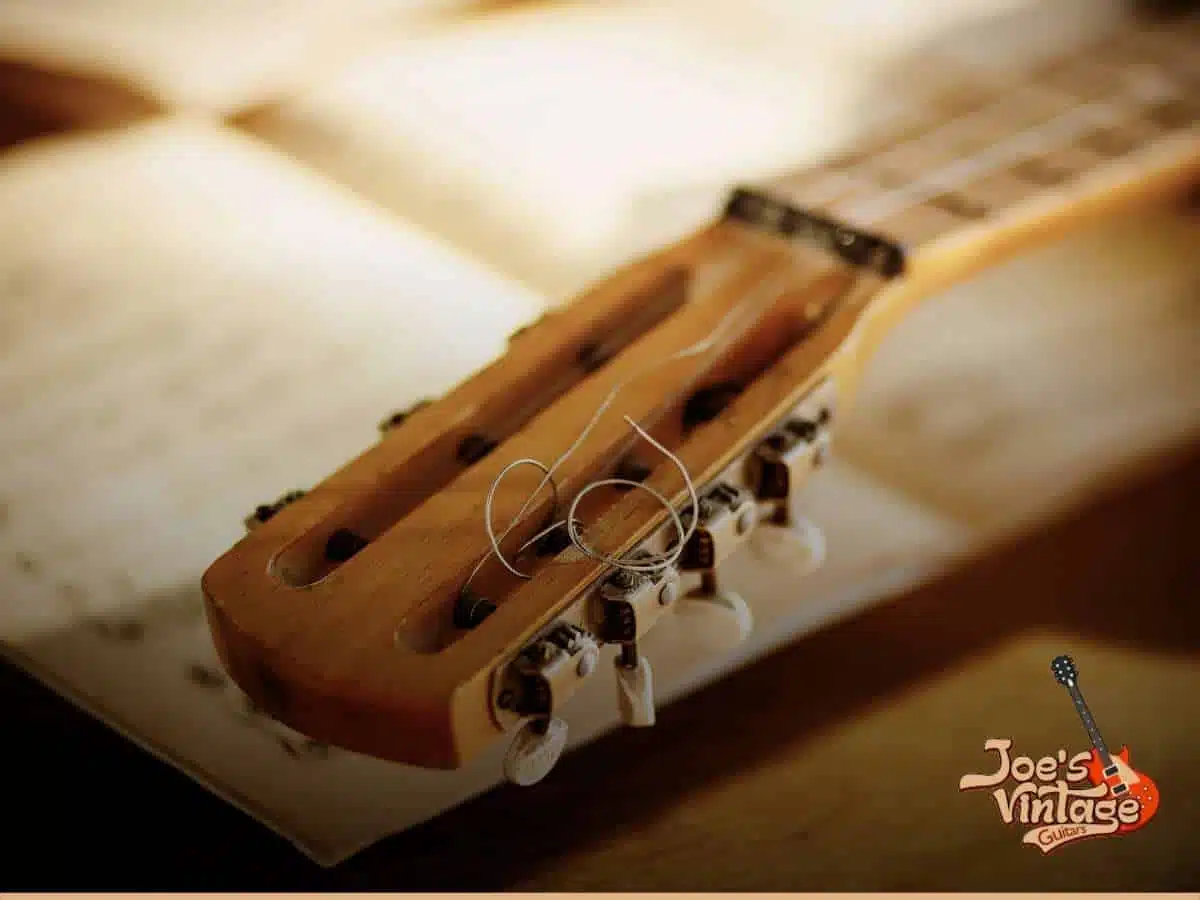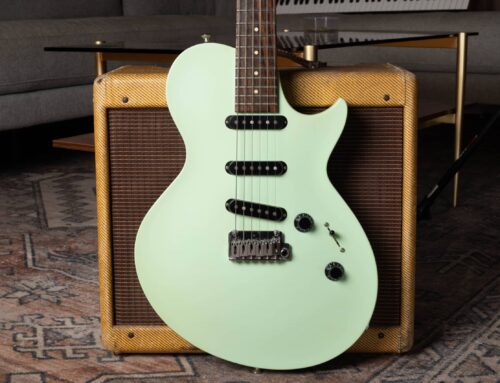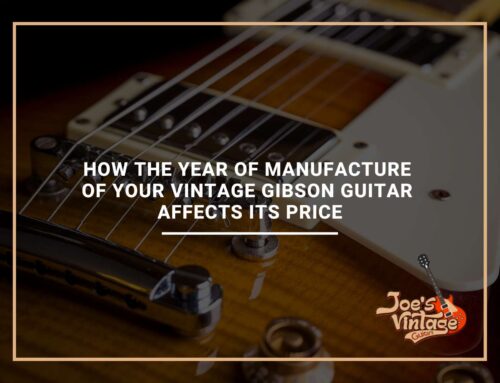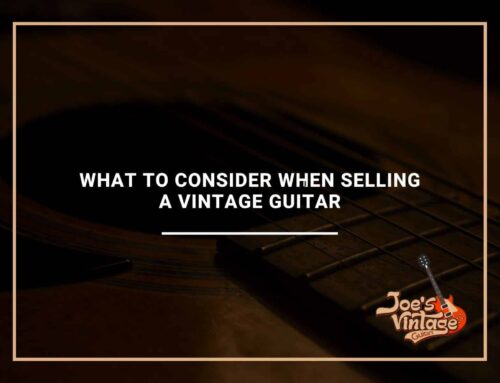Is Your Vintage Guitar Valuable? 7 Factors That Determine Its Value
Table Of Contents
- How Can You Determine That Your Vintage Guitar Is Still Valuable
- Key Factors That Primarily Dictate A Vintage Guitar’s Value
- How To Sell My Vintage Guitar In Mesa
- 1. Identify What You Have
- 2. Check Your Guitar’s Condition
- 3. Did You Alter The Guitar Recently?
- 4. How Is the sound?
- 5. Rare Materials
- 6. Research Properly
- 7. Sell Your Guitar At A Trusted Guitar Expert
How Can You Determine That Your Vintage Guitar Is Still Valuable
Knowing the instruments’ value is essential when purchasing or selling vintage guitars. Not only can you get a better price if you know your guitar’s value, but you also have a better idea of whether or not you should sell it in an auction or try to resell it privately.
Each guitar is unique and has its own story to tell, so it’s crucial to do proper research before buying or selling one. In this blog post, we’ll explain some factors that can help you determine the value of your vintage guitar so you can sell it to a trusted vintage guitar collector.
Key Factors That Primarily Dictate A Vintage Guitar’s Value
What makes a vintage guitar valuable? Is it the age or condition?
It all depends on its quality, rarity, and originality, to mention some. Here are some key factors that dictate a vintage guitar’s value.
Its Condition: An instrument in mint condition, with the original case and parts, is a sought-after find. Even the most superficial modifications and repairs will likely diminish its value. The quality drops markedly and rapidly when the guitar has a good or fair rank.
Its Rarity (Demand): Both factors usually go hand-in-hand. However, specialty collectors are willing to pay more for less-desirable guitars if they don’t have any others like them in their collection.
Its Age: Generally, older guitars will command a greater value than newer ones, but there are some exceptions. There are many ways to find out the value of a product, ranging from asking a consulting price guide to checking the prices of similar models, many of which come with warranties.
Provenance Value: Instruments with notable owners (especially guitar players) or those with historical significance will bring top prices. For example, a charred Stratocaster that Jimi Hendrix burned onstage sold for thousands of dollars in 2013.
How To Sell My Vintage Guitar In Mesa
Now that you know the basics to sell your guitar, check below the seven factors you need to consider to sell it sucessfully.
1. Identify What You Have
It is hard to tell the difference between a highly desirable 1960s model and a recent reissue by a glance unless someone is looking for those subtle differences. In short, only experts can notice those differences. It’s essential to identify the origin of any given instrument!
Hardware, finishes, electronics, woods, and other materials will provide useful clues when determining the age and value of the instrument.
A guitar price guide is an invaluable tool for research. It also tracks down the origins of any vintage guitar, so consider that.
2. Check Your Guitar’s Condition
Any significant blemish on the guitar will reduce its value. Older guitars usually have a little wear and tear, but unique vintage instruments will play well. They should reflect pride from the owner with an amazing sound.
Ask yourself the following before analyzing your guitar’s value:
- Does my guitar have scratches or cracks?
- Is the neck warped?
- Are the frets damaged?
- Are there separating glue joints?
With these questions in mind, you may be ready to sell your guitar to a vintage guitar buyer in Mesa.
3. Did You Alter The Guitar Recently?
Musicians usually don’t think about the value of their instrument 50 years after acquiring it or even just a few years after changing pickups or slapping stickers on it.
The less a guitar has undergone alterations, the better the value.
4. How Is the sound?
The guitar will lose value if it has a low-quality sound, even if it looks perfect. It should have a crisp, clear sound.
A fret buzz may be significant or minor depending on the cause. If the neck is severely warped, it will diminish its value. If setup work, however, is done before any tuning or buzzing issues arise, the value of the investment is negligible.
5. Rare Materials
Because Brazilian rosewood is an endangered species and its scarcity makes it difficult to produce, it is no longer a material used to build guitars. The same happens with ivory, tortoiseshell, ebony inlays, and embellishments. Their presence signifies a quality instrument, which usually impacts the guitar’s value.
6. Research Properly
If you do a quick google or eBay research, it will show you what others are selling your guitar for. This step is crucial before selling your guitar at any guitar shop.
You can also consult The Blue Book of Guitar Values and Vintage Guitar Magazine’s Price Guide to see what a guitar is worth.
7. Sell Your Guitar At A Trusted Guitar Expert
If your initial research leads you to believe you have found a genuine treasure, getting a nice offer from a reputable buyer may be the wisest decision. At Joe’s Vintage Guitars we can help! We have the best offers to give you a reasonable price. Plus, you can also find out the best guitars in our online store. Contact us for more information!

Joe’s Vintage Guitars
47 N Fraser Dr E
Mesa, AZ 85203
Phone: (602) 900-6635
Email: joesvintageguitars94@gmail.com
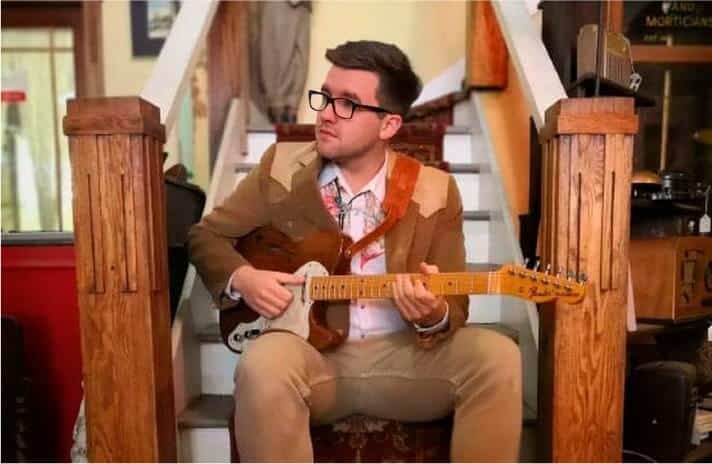
Written by Joe Dampt
“Driven by a love for classic tunes, I specialize in buying, selling, and appraising vintage guitars, bringing music and history together.”

